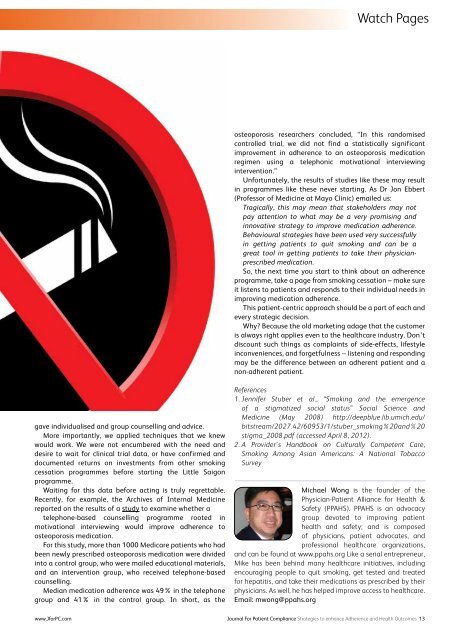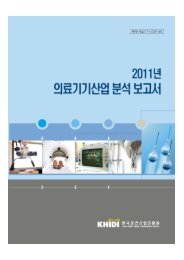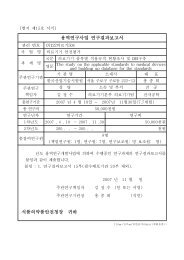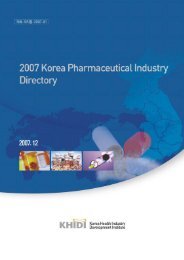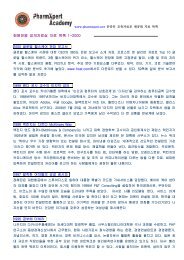Watch PagesHelping Patients Take Their Medication:Lessons from Helping Patients Quit SmokingSmokers are not patients -- or, at least, that’s the view thatmost people have of smokers. Like most “self-inflicted” healthrisks, like drinking too much alcohol and sharing needles, thestigma attached to smoking and smokers is pervasive 1 .Unfortunately, not treating smokers as “patients” andseeing smoking as a “disease” can lead us to not applyvaluable lessons from quit smoking programmes to helppatients take their medication.The interesting thing about smoking cessation is that weas a society often treat this as a social problem. For example,to get dad to quit, we solicit the help of his family (wife, kids,and friends). We suggest aids that may help, like exercise anddiet. We recommend that he see his doctor and try nicotinereplacement therapy. Surrounding the patient with thenecessary support that he needs to quit (and not what wewant) is critical.With that in mind, I, together with the VietnameseAmerican Cancer Foundation (VACF) and GlaxoSmithKline(GSK) developed a programme directed towards theVietnamese American community, targeting “Little Saigon”in Orange County, California. Little Saigon has the largestnumber of Vietnamese outside of Vietnam. Unfortunately,this community was facing a number of enormous challenges.It had one of the US market’s highest smoking rates (36 percent) 2 and had therefore been deeply impacted by the scarsof this addiction – death, disease and their consequenceson family wellbeing and livelihood. Moreover, entrenchedcultural and social acceptance of smoking made it an evenmore difficult task, with smoking for example still occurringin restaurants and offices with social impunity.We purposely engaged the entire community in theprogramme (doctors, a community patient advocate, anda pharmaceutical company). Local doctors were asked toactively speak with their smoking patients about the need toquit. As Dr Loc D. Bui (a Little Saigon doctor) urged his fellowcolleagues at the start of the campaign, “As physicians,we know the danger of smoking. I would like to see all thephysicians in our community talk to their patients aboutsmoking and strongly encourage them to quit.”The pharmaceutical GSK, although a manufacturer ofnicotine replacement products, was content to fund theseactivities without active product promotion. For example, ina survey of local physicians, doctors’ attitudes and beliefsabout nicotine replacement therapies involving gums,patches and lozenges were explored along with “cold turkey”,herbal supplements, diet, exercise, or anything else theymight recommend to their patients.These patients were made aware of the cadre of healthcareexperts, quit lines, and volunteers at the VACF that stoodready to assist them. “People don’t realise that it is notjust their health, it is the health and welfare of their wholefamily that the smoker puts at risk,” said Leonard Tran (thenExecutive Director of VACF). “Men who develop smokingrelateddiseases often leave their families without means forsupport. By quitting smoking, men can give themselves theirbest chance of being able to be there for their families in thelong term.”The community responded to VACF’s message. A youngwidow, for example, spoke on community radio to tell herheart-wrenching story of not getting her husband to quitsoon enough. Sadly, he had recently died, leaving his wifeand kids to deal with bills and payments, and continuing tolive their lives without him.The results? Activity on the quit lines and at VACFincreased dramatically. As one doctor observed, epitomisingthe programme results, “Since the programme started, I havehad 4-5 patients per month quit smoking which is 4-5 timesmore than I usually have.”However, what the programme had really done ismotivational counselling at its best -- doctors intervened asthe medical authority, the community provided stories andemotional support, and the local cancer foundation (VACF)12 Journal For Patient Compliance Strategies to enhance Adherence and Health OutcomesVolume 2 - Issue 4
Watch Pagesosteoporosis researchers concluded, “In this randomisedcontrolled trial, we did not find a statistically significantimprovement in adherence to an osteoporosis medicationregimen using a telephonic motivational interviewingintervention.”Unfortunately, the results of studies like these may resultin programmes like these never starting. As Dr Jon Ebbert(Professor of Medicine at Mayo Clinic) emailed us:Tragically, this may mean that stakeholders may notpay attention to what may be a very promising andinnovative strategy to improve medication adherence.Behavioural strategies have been used very successfullyin getting patients to quit smoking and can be agreat tool in getting patients to take their physicianprescribedmedication.So, the next time you start to think about an adherenceprogramme, take a page from smoking cessation – make sureit listens to patients and responds to their individual needs inimproving medication adherence.This patient-centric approach should be a part of each andevery strategic decision.Why? Because the old marketing adage that the customeris always right applies even to the healthcare industry. Don’tdiscount such things as complaints of side-effects, lifestyleinconveniences, and forgetfulness -- listening and respondingmay be the difference between an adherent patient and anon-adherent patient.gave individualised and group counselling and advice.More importantly, we applied techniques that we knewwould work. We were not encumbered with the need anddesire to wait for clinical trial data, or have confirmed anddocumented returns on investments from other smokingcessation programmes before starting the Little Saigonprogramme.Waiting for this data before acting is truly regrettable.Recently, for example, the Archives of Internal Medicinereported on the results of a study to examine whether atelephone-based counselling programme rooted inmotivational interviewing would improve adherence toosteoporosis medication.For this study, more than 1000 Medicare patients who hadbeen newly prescribed osteoporosis medication were dividedinto a control group, who were mailed educational materials,and an intervention group, who received telephone-basedcounselling.Median medication adherence was 49% in the telephonegroup and 41% in the control group. In short, as theReferences1. Jennifer Stuber et al., “Smoking and the emergenceof a stigmatized social status” Social Science andMedicine (May 2008) http://deepblue.lib.umich.edu/bitstream/2027.42/60953/1/stuber_smoking%20and%20stigma_2008.pdf (accessed April 8, 2012).2. A Provider’s Handbook on Culturally Competent Care,Smoking Among Asian Americans: A National TobaccoSurveyMichael Wong is the founder of thePhysician-Patient Alliance for Health &Safety (PPAHS). PPAHS is an advocacygroup devoted to improving patienthealth and safety; and is composedof physicians, patient advocates, andprofessional healthcare organizations,and can be found at www.ppahs.org Like a serial entrepreneur,Mike has been behind many healthcare initiatives, includingencouraging people to quit smoking, get tested and treatedfor hepatitis, and take their medications as prescribed by theirphysicians. As well, he has helped improve access to healthcare.Email: mwong@ppahs.orgwww.JforPC.comJournal For Patient Compliance Strategies to enhance Adherence and Health Outcomes 13


